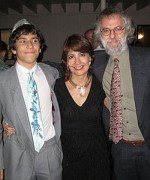Column Name
Title
A native of Mexico City, Sam Zyman attended the National Autonomous University of Mexico, where he earned an M.D., and Juilliard, where he earned both master’s and doctoral degrees in composition. He has taught medical histology and physiology in the National Autonomous University of Mexico’s School of Medicine, and has been a Juilliard faculty member since 1987.
Body
When did you first know you wanted to be a musician?
I have loved and studied music ever since I was about 9 years old, but it was only after my second year in medical school that I realized music was my true calling. I was simultaneously attending the National Conservatory of Music in Mexico City, studying piano and orchestral conducting. There was simply no comparison between the beauty and emotional power of music and such things as pathology, infectious diseases, or internal medicine (with all due respect to the medical profession).
Growing up, which of your teachers most inspired you?
Probably Héctor Jaramillo. My mother called him at the recommendation of my previous teacher, and asked if he would become my piano teacher. Héctor politely declined, explaining that he was a professional flutist, not a pianist. My mother insisted … and out of sheer courtesy, Héctor reluctantly agreed. As it turned out, he not only taught me piano, but was the first person to encourage me to improvise (mainly jazz) and to compose. I became a composer in large part thanks to Héctor Jaramillo.
What was the first recording that you remember hearing?
There was no familiarity with classical music in my family, but one day, probably responding to some sales pitch, my parents bought a collection of LPs titled The Most Beautiful Music in the World, an anthology of popular classical pieces recorded by rather obscure orchestras. I fell in love with it. I remember hearing the “Sabre Dance” from Khachaturian’s ballet Gayane, “Anitra’s Dance” (from Grieg’s Peer Gynt Suite), and the like. These LPs opened the first window into the world of classical music for me.
What’s the most embarrassing moment you’ve had as a performer?
As a pianist, I’ve had my share of memory lapses on stage, but perhaps the most embarrassing moment was once when I was conducting the Mozart Bassoon Concerto with a student orchestra and soloist. As the soloist was playing the cadenza, he got to a point where I was convinced it was time to bring the orchestra in—and so I did, only to discover, to my horror, that the soloist still had a few more bars to go. I had unwittingly ruined his cadenza!
If you could have your students visit any place in the world, where would it be?
Probably Venice, truly a unique place and one I talk about a lot in my classes. In addition to its stunning beauty, with the canals, islands, and incomparable atmosphere, Venice is an unbelievable artistic and musical treasure. I wish all my students had a chance to see it—especially now, because Venice is in more danger of sinking and disappearing than ever before.
What are your non-music related interests or hobbies?
I am extremely interested in current events and geopolitics and I hold strong and passionate positions on matters related to government policies, international relations, and the workings of society. I maintain an interest in science in general and biomedical science in particular, because my wife, Dr. Nancy Carrasco, is a very accomplished and distinguished biomedical scientist. I also very much enjoy cinema, travel, walking, and swimming.
What do you hope your students will remember about your teaching?
My goal in every class is to help them see the excitement and meaning of both the music itself and the theoretical aspects that contribute to our understanding of it. I want to tell them to pursue their art or whatever else they do with as much passion, positive energy, and enthusiasm as they can muster. If this answer seems too long or convoluted, let my students just remember the Neapolitan chord, which they all know I’m crazy about!
If you weren’t in the career you are in, what would you be doing?
I would have liked to be an active member of an international relief organization dedicated to fighting poverty. But this is probably more an ideal of mine than a realistic alternative. If I weren’t a composer, perhaps I would still be a teacher of something other than music.





